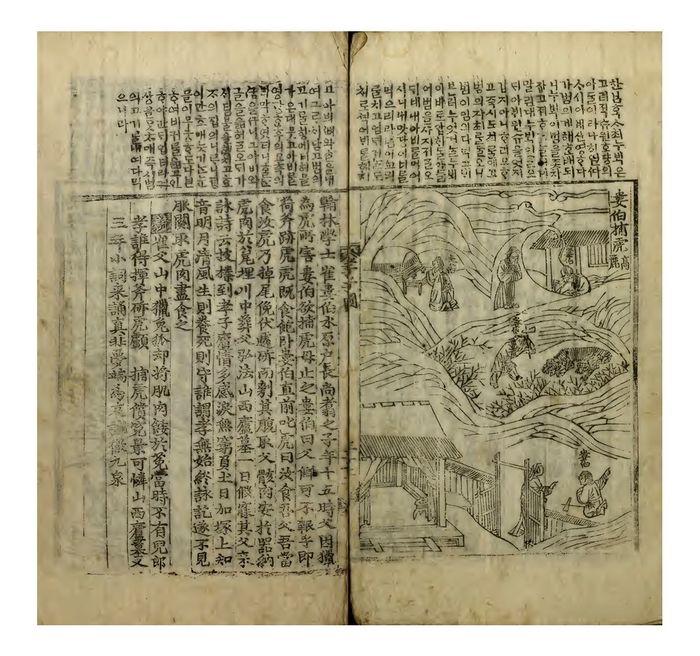"(Translation) 婁伯捕虎"의 두 판 사이의 차이
(→Student Translation : (Ewa)’’’) |
|||
| 36번째 줄: | 36번째 줄: | ||
==='''Student Translation : (Ewa)’’’=== | ==='''Student Translation : (Ewa)’’’=== | ||
---- | ---- | ||
| − | Hanlin academician | + | Hanlin academician Ch'oe Nubaek was the son of Sangja, the chief of Suwŏn household. When he was fifteen years old, his father was killed by a tiger during the hunting. Nubaek wanted to capture the tiger. His mother stopped him. Nubaek said: "How could I not revenge my father?" Then he put an ax on his shoulder and tracked the tiger. The tiger, with its stomach full, was resting. Nubaek stood in front and scolded the tiger: "You have eaten my father, I must eat you." The tiger just beat its tail, lying low on the ground. Nubaek swung the axe and cut the tiger’s belly open. Then retrieved from there the bones and flesh of his father, and placed them safely in an urn. He put the tiger’s meat in a jar which then he drowned in a river. He buried his father at the west slope of Hongbŏp mountain in a thatched tomb. One day, as if in a dream, his father came and intoning a poem said: parting the bushes I arrived at the mourning house of a filial son. He suffered greatly and shed many tears. Every day he carried more earth to put on the top. He knew how to call the bright moon and the light wind. He took care of me when I was alive and protected me after my death. Who says of filial love that it has no beginning and no end? He finished singing and disappeared. Having completed the mourning Nubaek retrieved the tiger’s meat from the river and ate it. <br /> |
| − | *Discussion Questions: | + | *Discussion Questions:<br /> |
| + | (YO) 戶長 is a title for a chief yamen officer.<br/> | ||
| + | For "jar which then he drowned in a river," he buried the jar under the water.<br/> | ||
| + | "He buried his father at the west slope of Hongbŏp mountain" To be precise, Nubaek performed a funeral for his father there. So perhaps "he buried his father with a funeral"? | ||
[[Category:2018 Hanmun Summer Workshop]] | [[Category:2018 Hanmun Summer Workshop]] | ||
[[Category:Intermediate Training Group]] | [[Category:Intermediate Training Group]] | ||
2018년 7월 17일 (화) 23:15 판
| Primary Source | ||
|---|---|---|
 |
Title | |
| English | [(Ch’oe) Nubaek captures the tiger | |
| Chinese | 婁伯捕虎(Nubaek p’oho) | |
| Korean(RR) | 누백포호 | |
| Text Details | ||
| Genre | ||
| Type | ||
| Author(s) | 偰循 (Samgang haengsil-to 三綱行實圖) | |
| Year | 1434 | |
| Source | ||
| Key Concepts | ||
| Translation Info | ||
| Translator(s) | Participants of 2017 Hanmun Summer Workshop (Intermediate Training Group) | |
| Editor(s) | ||
| Year | 2018 | |
Original Script
- 【詩】崔父山中獵兎狐。却將肌肉餧於菟。
- 當時不有兒郎孝。誰得揮斤斫虎顱。
- 捕虎償冤最可憐。山西廬墓又三年。
- 小詞來誦眞非夢。端爲哀誠徹九泉。
Translation
Student Translation : (Ewa)’’’
Hanlin academician Ch'oe Nubaek was the son of Sangja, the chief of Suwŏn household. When he was fifteen years old, his father was killed by a tiger during the hunting. Nubaek wanted to capture the tiger. His mother stopped him. Nubaek said: "How could I not revenge my father?" Then he put an ax on his shoulder and tracked the tiger. The tiger, with its stomach full, was resting. Nubaek stood in front and scolded the tiger: "You have eaten my father, I must eat you." The tiger just beat its tail, lying low on the ground. Nubaek swung the axe and cut the tiger’s belly open. Then retrieved from there the bones and flesh of his father, and placed them safely in an urn. He put the tiger’s meat in a jar which then he drowned in a river. He buried his father at the west slope of Hongbŏp mountain in a thatched tomb. One day, as if in a dream, his father came and intoning a poem said: parting the bushes I arrived at the mourning house of a filial son. He suffered greatly and shed many tears. Every day he carried more earth to put on the top. He knew how to call the bright moon and the light wind. He took care of me when I was alive and protected me after my death. Who says of filial love that it has no beginning and no end? He finished singing and disappeared. Having completed the mourning Nubaek retrieved the tiger’s meat from the river and ate it.
- Discussion Questions:
(YO) 戶長 is a title for a chief yamen officer.
For "jar which then he drowned in a river," he buried the jar under the water.
"He buried his father at the west slope of Hongbŏp mountain" To be precise, Nubaek performed a funeral for his father there. So perhaps "he buried his father with a funeral"?